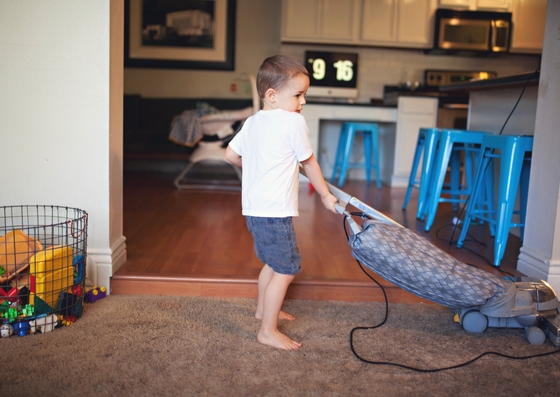He just needs a good spanking…
You just need to show her who’s boss…
You’re too nice to him. He’s not scared of you, and kids need to fear their parents…
If you just [insert useless piece of advice here] then she’ll start listening to you!
Do these pieces of useless advice sound familiar too you?
Unfortunately, as a parent of a strong-willed child, your well-meaning friends and family members have probably said something like this to you a time or two (or 20) to let you know that they don’t approve of the way you’re parenting your strong willed child.
All parents hate receiving unsolicited advice, but because of the unique behaviors of strong willed children, their parents seem to have to carry the heavier burden of having to hear these statements day after day from someone who has absolutely no idea what it’s like to interact with a strong-willed child each and every day.
Your friend’s kid and your kid are different. She doesn’t understand what it’s like to parent your kid–and unless she has a strong-willed child of her own someday, she’ll never fully understand your experience–yet that doesn’t stop her from giving you endless advice as to how to parent exactly like she does.
Your parenting experiences just are not the same, but she doesn’t get that. She thinks that her kid acts the way he does because of her excellent parenting skills; and on the flip-side, she thinks that your child is argumentative, defiant and stubborn because of your sub-par parenting abilities.
I’m not going to lie to you…your job raising a strong-willed child is more challenging than other parents. But you already know that. You’ve learned it from your years of experience watching how other parents can say and do the exact same things as you to get their child to listen, while your child is still arguing and fighting your every direction.
While I can’t take that away from you completely, I do have some really good news for you…
That child that you’re raising–who argues with everything you say and sometimes makes you wonder if you have the slightest idea what you’re doing in this whole parenting gig–is going to do great things in life.
That #swc you're raising is going to do great things in life! #parenting Share on X
A strong-willed child is more likely to have excellent leadership skills (which he’s practicing with you right now), an innovative and entrepreneurial spirit (which he tests out on every suggestion you give him, offering just a slightly better option to yours, at least in his opinion) and strong skills in negotiation (need I say how he’s testing this out with you today?).
In addition to those benefits, your child is more likely to earn a higher income than other rule-following adults , that is if you don’t remove the very characteristics that will lead to these positive experiences in the name of discipline (which is exactly what those useless pieces of advice are suggesting).
Did you know your #swc is likely to earn a higher income as an adult? #parenting Share on X
The SWC’s Personality Doesn’t Need to Be Changed, It Needs to Be Guided
Unfortunately, there is a misconception in the world that a strong-willed child needs to be changed (or trained, or punished into submission, depending upon who you talk to). This simply isn’t true.
As I mentioned before, strong-willed kids actually experience a variety of benefits in life as they grow older, but they can only experience those benefits if they actually still possess some of those very traits that make them strong-willed people.
Spanking a child until he complies out of fear will destroy that innovative and entrepreneurial spirit. Instead of thinking for himself and coming up with new ideas, he will now look to you (out of fear of being punished) to be the authority on most things.
[Check out this interesting University of Minnesota lecture about careers and one’s tendency for obedience versus independent thinking to understand this more clearly.]
Reminding her that you and only you are the authority on everything will slowly chip away at that leadership potential, making her self-conscious and afraid that she doesn’t have the skill to lead herself, let alone lead anybody else.
Having a strong-willed child is actually a very positive thing, because your child may have more potential to face the challenges that will naturally occur in this world throughout her life, as long as your role as her parent helps to cultivate those skills, versus punish them to extinction.
So now for the burning question on all of your minds…
How exactly do I help cultivate my child’s strong-willed traits for good without becoming a permissive parent in the process?
You’ve decided that you don’t want to spank or yell or otherwise punish your child just for being himself, but you’ve noticed that his strong-willed nature is getting him into more trouble than it is helping him right now.
It’s hard to imagine that the personality he has now will help him to be successful in anything, from making friends to following rules at school to being a good partner in any relationship to finding happiness and achievement in a job someday.
Right now, all you know is that everything with him turns into a battle, he doesn’t listen to anyone but himself, and he doesn’t know how to follow the rules or compromise with others.
What are you supposed to do to help him to use those strong-willed traits for good, instead of the negative ways he seems to be so accustomed to right now, without becoming a lenient parent who just lets him have his way to avoid an argument?
Just like any parent, raising the type of child (and someday adult) that you want to raise doesn’t happen with just one technique or one thing that you do with your child today. This happens over a long period of time, with daily interactions that teach life lessons that are a good fit for the strong-willed child.
The key to having the most success at teaching these lessons is understanding who your child is, what makes him do the things that he does, and meeting him at that level, instead of sticking to some outdated (yet still utilized) parenting advice that completely contradicts the person he is and will only result in every disciplinary interaction turning into an argument.
The key to success with #discipline is understanding who your #child is, meeting him there Share on X
This is why you can do the exact same thing as your friend does, and her child listens while your child argues. Different techniques are necessary for different personality types, and your child needs parenting techniques that don’t fall into that traditional style that your parents and grandparents keep suggesting that you do.
If you’re sick of arguing about everything with your child and worrying about what kind of adult your child is going to turn into based on her current behavior, try some of these alternatives to punishment that will leave you feeling less guilty about your interactions with your kid and will give your kid a chance to start using those strong-willed tendencies for more positive things.
Tip #1: Don’t Be the Expert
You already know that your child doesn’t think that you know anything, but that doesn’t stop you from pleading your case. You want her to know that you’re an adult and you know what’s best for her (which is about 97% true) but your way of going about this is probably not sinking in with her very well (hence why every time you try to tell her what to do, she argues back and suddenly you’re trapped in a power struggle).
Once you recognize that your child is going to argue with basically everything that you say (and you’re willing to accept that) your job becomes so much easier. You no longer have to be the expert (since you know nothing anyway, right?).
Your child’s innate ability to question everything and argue when things don’t seem right, actually helps her to arrive at more well-thought-out conclusions to life’s dilemmas, making her the perfect resource for teaching herself the very lessons that you want her to learn.
Instead of being the expert about everything, step back and allow your child to explore the life lessons that you’re hoping to teach, by facilitating conversations that allow your child to weigh in on important topics before you give your expert, adult advice that naturally leads to an argument.
Let’s look at an example…
While getting out of the car at the grocery store, mom asks 4-year-old Kay to wait until she can get to the other side of the van to help her out of the car. Kay decides to get out on her own and is walking away from the van by the time mom gets to Kay’s door.
Mom’s first instinct is to get upset with Kay and let her know why her actions were not acceptable, as well as dangerous (which they were). But if mom wants to make the most out of this teaching moment, she’ll recognize that lecturing Kay (who has a strong-willed personality) will be less effective than having a logical conversation with her that allows Kay to weigh in on why her choice was wrong and what she could do differently in the future.
Notice how this shift in thinking doesn’t change the fact that the misbehavior needs to be addressed, it simply addresses the issue in a way that has the highest potential for having a lasting impact on Kay’s behavior and thinking.
Mom isn’t being a permissive parent, she’s being smart and choosing the best option to have the strongest impact on Kay, leading to her goal to teach her a life lesson here.
Below is a comparisons between the “expert” role that mom could have taken and the “non-expert” role that allows Kay the opportunity to engage in a conversation much more willingly and productively.
I told you to stay put. You could have gotten hit by a car!
VS
I asked you to stay in the car but you decided to get out on your own. Why do you think that makes mommy feel nervous (or scared, or frustrated, etc.).
In the first scenario, mom tells Kay what’s wrong with her choice and the consequence that could have come from it. The problem with this interaction is that this leaves about a million answers for Kay to argue with, placing more emphasis on the argument about how mom is reacting, and very little emphasis on the most important part of the conversation: the potential consequences that could have come from her actions.
What kind of answers would your strong-willed child have come up with to the first statement made by mom?
• Yeah, but I didn’t.
• I’m a big girl. I won’t get hit by a car.
• There weren’t any cars mom!
• You could have gotten hit by a car too, mom!
For a strong-willed child, the list is pretty much endless here!
Now let’s look at the second statement. This statement has much less potential for argument and also allows for a great conversation to develop in which your child comes up with reasons why this was a bad idea (and not all of the reasons will be the ones that you were initially thinking, yet they can still be great ones).
What kind of answers would your strong-willed child come up with to the second statement? In all honesty, it might start with something negative, like
- I don’t know. Because you like being mean?
- You should not be mad. I did not do anything wrong!
Strong-willed kids are pretty good at this, so it might take some response from you to remind them that there are some reasons and you can think of some, but that you’re interested in what their reasons are too. With that, most kids will be motivated to give their opinion versus having to listen to your lecture as to why this was a bad idea.
- Maybe because you thought I might get hit by a car?
- Maybe because you were scared because you didn’t know where I was?
These kinds of statements help to address the main issue that you’re trying to teach your child in the moment, and since the ideas have now come from her, suddenly she’s going to be more agreeable to them.
To get the most out of these conversations, I suggest that you use The Narrator Technique and/or The Limit Setting Technique from my Busy Mom’s 9-Step Guide to Raising Kids who Actually Want to Listen, as these techniques offer suggestions for how to go more in-depth with your child’s exploration of the consequences of their actions, without you having to be the meanie who doles out the consequences (although you will have to do it sometimes).
Tip #2: Emphasize Empathy
Let’s face it, your child is selfish. You may have noticed that your child likes to argue and have his way so much that he struggles to see anyone else’s point of view—child or adult.
You might feel guilty admitting that, but you should know that all kids are pretty selfish until they reach preschool age, and some continue that selfish behavior long after.
The reason for this is that the human brain is not hardwired for empathy at birth…it’s hardwired for survival, which leads to selfishness. This is why we see infants, toddlers and even some preschoolers using aggression to get what they want without very much remorse for the things they’ve done to cause harm to others.
All children—including yours—go through a phase in which they lack empathy, so please don’t think that since your child appears mean and self-centered right now that this means that your child will grow into a selfish adult.
While it’s important to notice this deficit and address it, lacking this capacity as a child does not guarantee that same lack of capacity as an adult.
Many parents try to teach their children how to have better manners and be more empathetic towards others, but teaching these tasks can be more challenging for parents of strong-willed children since every teaching moment can turn into a power struggle.
In addition, since he thinks he knows everything, convincing him that other people have opinions and feelings and that he should think about those things before acting can especially be a challenge, because it requires him to do something that he simply does not believe in.
When using Tip #1, make sure that your conversations touch on empathy. Our example with Kay is a perfect example. Mom introduced her feelings to help Kay understand that the choice she made actually affected the feelings of others.
Many of your interactions with your strong-willed child should focus on helping him to understand the consequences of his actions on others, but again, the focus doesn’t have to be on threats of punishments, but instead simply helping him to connect his behavior with the impact on others.
Here are a few ways to help teach empathy to a strong-willed child that have the best potential for the child to actually learn how to be more empathetic.
When 5-year-old Maddox hits his friend, don’t say…
That’s naughty. You say you’re sorry right now!
Instead, say something that informs Maddox about how his action just affected someone else, like…
No thank you, Maddox. When you hit Gabe, that made him cry. Do you see the tears on his face right now?
OR
No thank you, Maddox. Can you see what happened to Gabe when you hit him? How do you think he’s feeling?
When 4-year-old Elliott refuses to eat the food that you made for him and attempts to throw it on the floor, don’t say…
I worked for a whole hour on that. You’re going to eat it and you won’t leave the table until you’ve eaten it.
OR
You’re being rude. You should be telling me thank you, not complaining!
Instead, say something that won’t incite an argument but will still remind him that his actions were hurtful, like…
Mommy worked hard on that meal, buddy. How do you think that makes me feel when you push the food away like that?
OR
I didn’t realize that you didn’t like that kind of food, but is there a better way that you could tell me that you don’t like it that doesn’t hurt my feelings?
If you’re looking for more ways to encourage empathy without getting into constant power struggles, I would encourage you to check out The Emotion Coach Technique in my free guide for more in-depth explanation on how to incorporate empathy and emotions into regular conversations.
Tip #3: Use Natural Consequences as Often as Possible
The biggest complaint I receive from parents of strong-willed children is that they give out a consequence and the child seems disinterested and not affected by chosen consequences.
Things like spanking, time out, taking away a toy, keeping the child from fun events, and other commonly used consequences do not tend to have a consistently successful outcome for strong-willed children, although they might work some of the time.
Why is that?
Well, the main reason is that a strong-willed child has an idea in mind and sometimes, fulfilling that idea brings more satisfaction to the child than any threat of punishment. This means that if the child’s intentions are more rewarding to her personally than the consequence is threatening, then the child will continue on with the behavior because the reward outweighs the consequences.
This is actually a good thing, even though it’s hard to recognize when you’re faced with a misbehaving child in a grocery store or other public setting and no amount of threatening seems to sway her from that misbehavior.
Why is this a good thing? Well, it means that your child is determined and cannot be swayed by obstacles that get in the way of her goals.
It means that she’s more capable of saying no to peer pressure if she thinks that her goal is more important than what others want her to do.
It means that she’s willing to endure pain and other consequences if she believes strongly enough in her cause.
It means that she’s determined to push through the hard work and setbacks in life that get in the way between herself and her goals.
So, with all of this positive talk about why this means she’ll be so motivated and determined, how do you get her to listen and follow directions right now so that she can learn to grow up to be a law-abiding citizen who sometimes may have to listen to others, even if it’s not in line with her goal?
This is a major concern for parents of strong-willed children, and rightly so. The world is not going to cater to their strong-willed nature, so parents cannot simply hope that everyone else will talk in the right way that doesn’t set the child off into an argument.
The focus of today is preparing your child for those natural consequences that will occur in the future.
Prepare your #child today for the natural consequences of tomorrow. #parenting #swc Share on X
So fear not…just because your child cannot take direction from adults today does not mean that he will act this way when she’s a teenager or when she’s an employee and her boss asks her to do something.
Just as she cannot complete a complex math problem today, but will be able to at some point in her life with gradual teaching of this lesson, so too will she be able to handle the ideas and direction of others as long as she receives gradual teaching of this lesson, too.
The trick is to try to use life’s natural consequences for her as frequently as you can, to help prepare her for life’s consequences in the future.
Threatening to spank your strong-willed child is not recommended because it doesn’t help her to understand the natural consequences of her actions. Instead, it simply teaches her that you think that what she did was wrong and you will now provide some pain to her to let her know of that.
It doesn’t teach her why it’s wrong or what will happen later on in life if she chooses to repeat the behavior (which many strong-willed children tend to do, since they aren’t convinced that it’s such a bad choice in the first place).
Utilizing natural consequences helps to teach her what will happen in life if she continues to act in this manner and gives her better insight into how to prepare for the future.
So what are natural consequences?
Natural consequences are consequences that are as close as possible to the natural things that will occur in life if the behavior were to occur in different contexts, even if there isn’t an adult around to give the consequence.
Natural consequences are not a one-size-fits-all kind of approach to discipline, because they cannot be the same for every action. For example, you can’t have a plan for a timeout any time a rule is broken because time out might not be the most natural consequence for the misbehavior that the child is showing every time.
Unfortunately, natural consequences take more work and mental effort on the part of the parent to ensure that the punishment fits the crime, if you will.
Here are a few examples of behaviors and natural consequences.
At the school carnival, mom asks 5-year-old Angelica to carry her art project in her bag. Angelica refuses and tells her mom to hold it. Mom reminds her that there are 3 children in the family and mom doesn’t have the space to hold everyone’s things and that she is asking Angelica to be responsible for her own things. Angelica leaves the art project on the table and while mom does notice the art project sitting on the table, she leaves it behind.
At the playground, 4-year-old Darius is given multiple warnings to use kind hands with the kids he is playing with. Despite multiple reminders, he continues to hit the other children. His mom asks him to sit near her and says, “When you hit, others do not want to play with you. Let’s sit here to see how that feels.”
*Most moms would tell me right here that if they did this to Darius, he would throw an absolute fit and wouldn’t just sit quietly at the bench with mom. This is why the next example also includes Darius!*
When asked to sit quietly, Darius refuses. He screams and threatens to his mom that he’s going to hurt her if she doesn’t let him go play with his friends.
After multiple attempts to calm him down have failed, mom says, “When you scream like that, you hurt other people’s feelings and ruin their fun at the park. We will be going home now so that we don’t bother others anymore.” Mom carries a screaming Darius to the car.
Don’t beat yourself up if you can’t do a natural consequence every time. Parenting is challenging and a misbehaving child is incredibly stressful. Sometimes, you will mess up and threaten a consequence not even remotely related to the behavior and that’s OK!
I’m a trained counselor who works with oppositional children daily, and I still mess up…more often than I’d like to admit.
When that happens, shake it off, remind yourself that you’re doing the best you can and you’ll do better next time. Then, as hard as it is, try to forget about it and move forward because there’s no benefit in dwelling in our past failures!
For more guidance on how to set appropriate consequences and how to warn the child ahead of time of the consequences that might occur, check out The Limit Setting Technique in my guide.
Your job is incredibly difficult. You spend your days arguing with a smart and strong-headed child. You know that there are positives to come from this personality, but that doesn’t always help you to get through the day because these days are absolutely exhausting and you’re surprised that your little one can outlast you in most arguments, even small little decisions that don’t seem worth the fight!
Understanding your strong-willed child is the key to your success in helping him to learn how to be a more agreeable person, without completely changing what makes him who he is.
Once you learn some ways to interact with him that will help you to avoid a power struggle, without becoming a permissive parent, you’ll find that the road to parenting your strong-willed child will start to look less bumpy and more manageable!
Have you tried some of these techniques and saw some changes in your child’s behaviors? Share your story below to help other moms who might still feel hopeless that their lives are destined to be filled with endless power struggles.












Leave a Comment